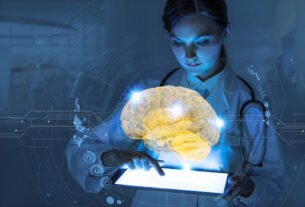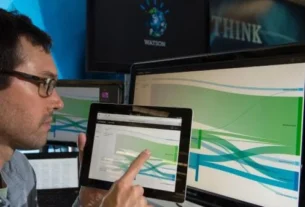The second report in the series shows how artificial intelligence is helping in the development of new medicines and treatments, making the process more efficient and accessible.

In the second episode of the series “Digital Minds”, Fantástico talks about the potential of artificial intelligence to revolutionize the health sector.
On the one hand, the possibility of creating medicines at a speed never seen before. On the other, diagnostic systems that are much more efficient than those that exist today.
Before explaining, let’s cross North America, because a great innovation is emerging in Canada, more precisely in a small building in Toronto. It is for the diagnosis of Alzheimer’s, a disease that still has no cure.
Dr. Cohen is a medical collaborator at RetiSpec, and his team provided the company with hundreds of images of the brains of patients with and without Alzheimer’s. The goal is for artificial intelligence to learn to identify the disease.
The images, collected through PET scans, a complex and expensive exam, are analyzed by AI.
“We usually say that the back of the eye is the front of the brain. That’s why the company also took fundus images of these same patients – those who had and those who didn’t have Alzheimer’s,” says Cohen.
In this way, the artificial intelligence learns to identify patterns in the eyes that may indicate the presence or risk of Alzheimer’s, allowing for early diagnosis without the need for a CT scan.
But how does the AI relate the brain scans to the images of the back of the eyes? What is it finding in the eyes that doctors can’t see? That’s still a mystery.
And this happens frequently with artificial intelligence: an interesting result appears, but how the AI got there… nobody knows. In any case, the advance is significant.
In addition to artificial intelligence, a special camera was created to photograph the eyes. The idea is to provide a simple and accessible way to diagnose Alzheimer’s long before symptoms appear, which could allow for early treatment and prevent the disease from progressing.
Now, we return to North America, to the Boston region, where the Massachusetts Institute of Technology (MIT) and Harvard University are located.

It was at Harvard that engineer Júlia had an innovative idea for her master’s degree, using deep learning artificial intelligence to detect 73 types of emotions on people’s faces.
Dr. Rosana already runs a company that develops new medications. She explains that artificial intelligence has accelerated the work of discovering new molecules, making it much more efficient than would be possible for humans alone.
“Artificial intelligence can understand all the data generated during drug development much more effectively,” she says.
She also uses AI to study a part of DNA that, until recently, was thought to be useless, but which may be involved in autoimmune diseases, those that cause the body to attack itself.
Our work now is to discover new treatments for these chronic diseases,” says the doctor. She hopes to begin clinical trials next year.
We will also explore the secrets of artificial intelligence companies, which have a lot to hide amid the competition between the US and China.




